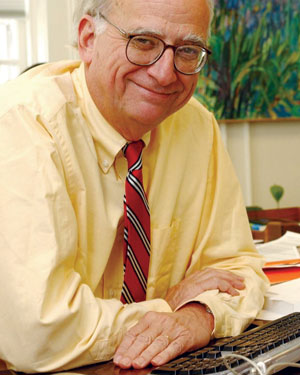NEUROSCIENCE has not been kind to the concept of free will. In recent years, the field has given us a picture of the conscious mind that isn’t very flattering—it often looks to be quite an underachiever compared to the unconscious mind, and it’s also disturbingly willing to take credit for work it didn’t do.
Neuroscience shows us a brain that is determined by its physical characteristics, a brain that can be understood as a very complicated mechanism. Can a mechanism be said to have free will? And if there is no free will, what happens to the concept of personal responsibility?
“When you go through a whole journey of 50 years in brain science, you start wondering about that,” author Michael S. Gazzaniga told me, in a conversation over the phone. In his new book, Who’s in Charge?: Free Will and the Science of the Brain (Ecco; $27.99), he explores these questions in depth.
Gazzaniga is a neuroscientist, and he was involved in some of the groundbreaking studies that clash most dramatically with our instinctive notions about how our minds work and how we decide. Gazzaniga worked with people who’d had such severe epilepsy that the only course of treatment left to them was a surgery to sever the connections between the left and right hemispheres of the brain. The curious thing about this surgery is that patients who had undergone it did not notice any difference and never reported anything unusual.
Gazzaniga’s insight was to test these patients by feeding different information to the two hemispheres. When the hemispheres are severed, what the right eye sees only makes it to the left hemisphere, and what the left eye sees only makes it to the right hemisphere. The results of Gazzaniga’s experiments are fascinating.
“It’s really a multi-agent system in there,” he explained. “There’s a bazillion control systems in there running our lives. And which one is sort of in our conscious mind at any moment is the result of a competition that goes on with these agents.”
But when the hemispheres are severed, the agents on one side can’t share information with the agents on the other side. The left hemisphere is the side that handles language, so initially, this is the side that answers questions. And when asked, it is happy to explain and take responsibility for actions initiated by the right hemisphere in response to information not at all available to the left. How does it do this? Well, it just makes something up and believes that it is true.
This is done by a part of the brain called the interpreter, and though it may seem a little dishonest, it’s just doing its job. The interpreter is what explains your mind to you. It gives you your personal narrative—gives you a sense of yourself as a unified being, rather than an anarchy of independent agents. Often what the interpreter tells you is just a useful fiction, and sometimes, as Gazzaniga’s experiments demonstrated, it is wildly incorrect about what’s happening in the brain. But what it gives us is what we believe.
Other experiments have shown that often the interpreter will give the conscious mind credit for decisions and actions that were actually the unconscious mind’s. And what is attributed to conscious mind are sometimes things it is simply way too slow to actually accomplish.
This has given some cause to think that all consciousness might be is an after-the-fact explainer: a device to rationalize and take credit. If this is true, then it doesn’t make much sense to talk about free will. But late in the book, Gazzaniga sticks up for conscious decision-making, will power and restraint. These things do exist, he shows us, and he makes the case for their importance in how the mind operates.
So, does this mean he believes in free will? “The idea of free will seems antiquated and out of date and not very helpful to understanding what we humans are all about,” he responded.
Gazzaniga has spent his career studying the brain, and what he has seen is a gloriously complicated biological mechanism, but a mechanism nonetheless. It is made out of matter subject to the laws of the universe.
“You know, that concept that there’s something in there pulling the levers, that works independently of the natural forces of the world, doesn’t make much sense. This an idea that’s time has come and gone. And now we should be thinking about other matters that are of social relevance.”
What Gazzaniga is referring to is the question of responsibility. Not whether it can be said to exist in a world without free will—he argues forcefully in the book that the two concepts don’t depend on each other, and that people must be held accountable for their actions. Gazzaniga believes the real question is how to hold people accountable for their actions.
Michael Gazzaniga Booksigning
Tuesday, 7pm; book purchase or $10 gift card
Kepler’s, Menlo Park



